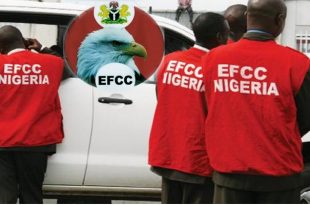
Nigeria, through its anti-graft agency, Economic and
Financial Crime Commission (EFCC), has been commended for its determination and
zeal to tracing and recover criminal assets.
This commendation was made at a meeting between the
acting Chairman of the EFCC, Ibrahim Magu, and Head of International Collaboration, National Anti-Corruption Commission, Saudi Arabia, Dr. Nassar
Abaalkhail.
Magu also delivered a paper on November 8, 2017, at
the ongoing seventh Session of
Conference of the States Parties to the United Nations Convention Against
Corruption taking place in Vienna, Austria.
The 10-page paper entitled: ‘International
Cooperation in Relation to Technical Assistance: The Nigerian Experience’ which
he delivered, gave detailed account of efforts by the commission at tracing and
recovering all stolen treasures from the country's coffers.
According to a statement made available to journalists on Wednesday by the commission Head, Media and Publicity, Wilson Uwujaren, the Head of
International Collaboration, National Anti-Corruption Commission, Saudi Arabia, Abaalkhail, who
lauded the commission efforts said: "From what I have heard, Nigeria's
effort at asset tracing is remarkable. Nigeria is indeed a role model for
countries, including developed countries. We have so much to learn from Nigeria."
While commending Nigeria, the Commissioner, Sierra
Leone Anti-corruption Agency, Ady
Macauley, also said: "The EFCC, capably represented by Magu, is not
only formidable, but a pride to the African states. My men were in Nigeria a
fortnight ago to understudy your operations, and I must confess, we have a lot
to learn in investigation, prosecution and asset recovery.”
In his presentation, Magu, who was a panelist at
the Implementation Review Group attended by over 100 delegates, detailed the
Nigerian efforts in asset recovery, including the progress made in the specific
cases related to late Sani Abacha’s loot, Malabu oil, Diezani and associates as
well as arms procurement scandal.
He said these efforts cut across Switzerland, US, United
Kingdom, UAE, Jersey Island and Panama.
According to him, “EFCC monetary recoveries from
May 2015 to October 20, 2017, were in excess of N738.9 billion which is equivalent
to over $2.9 billion. This does not include
smaller currencies like Durham, CRA and British Pound."
Magu also said employing the mechanism of the
non-conviction-based forfeiture provided in Section 17 of the Advance Fee Fraud
and Other Fraud Related Offences Act, 2006, the EFCC has also made a lot of recovery locally.
He stated that “within this year alone, the commission
recovered stolen assets running into several millions of US dollars and
billions in naira. This include the sum of $43 million recovered from Nigeria's
former Minister of Petroleum, Deziani Allison-Madueke, and N2 billion spread in seven accounts within
three Nigerian banks laundered from the Federal Capital Territory Police
Command salary accounts."
In his recommendations, The EFCC boss sought improved
coordination and cooperation among state parties in asset recovery through the
consideration and adoption of measures that will remove traditional 'barriers
such as bank secrecy consistent with Article 46(8) and dual criminality Article
46(9) as well as simplify legal technicalities in the recovery and repatriation
of stolen funds.
Magu in his paper, further sought measures to
reduce cost of recovery of assets for developing countries and ensure speedy
return of all stolen assets to victim states in line with the current
resolution sponsored by Nigeria.
He also called for sanction and prosecution of any
financial institution that violates AML/CFT measures and the maintenance of a
public register on beneficial ownership.
No comments:
Post a Comment